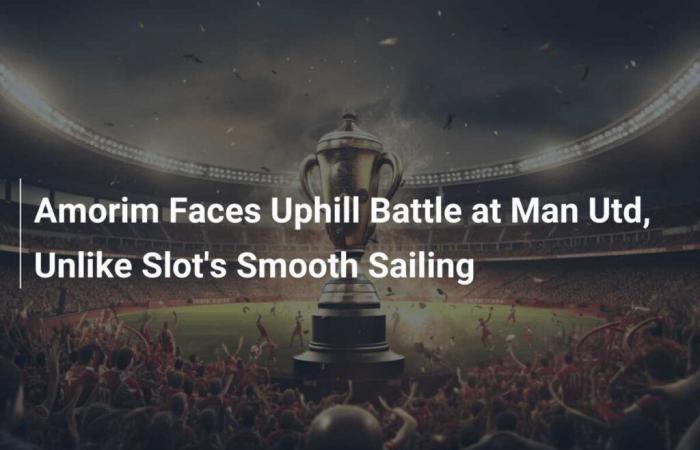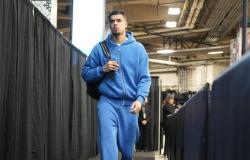This Sunday at Anfield, we are witnessing a narrative shaped by two contrasting managerial careers.
Arne Slot has taken the reins of an exceptional squad brimming with talent, while Ruben Amorim finds himself at the head of a prestigious club, Manchester United, but faced with a squad that leaves a lot to be desired. In essence, this is where the divergence lies.
It’s hard not to admire Slot. Unlike some who simply emulate Jurgen Klopp, he has firmly established his identity as a manager. His behavior is warm, really friendly, a real breath of fresh air in the dynamic atmosphere that often surrounds football management. You just can’t hate him.
Slot showed remarkable humility, choosing not to overdo his contributions, despite a wise decision to maintain the elements that made the team successful rather than impose unnecessary changes. He did not resort to self-aggrandizing speeches about a “new vision” or introduce incomprehensible jargon that plagues modern football.
Liverpool benefit from depth in every position, with five or six strikers capable of shining in any team across Europe. The presence of natural leaders like Virgil van Dijk has allowed the coach to foster a harmonious environment while allowing his star players to express themselves.
While Manchester City’s dip in form has undeniably benefited Liverpool, Slot’s managerial skills thus far cannot be ignored.
On the other hand, Amorim is tasked with one of the most difficult tasks in football: resurrecting a sinking Manchester United. The current squad is filled with mediocrity, almost requiring a complete overhaul to align with the club’s lofty ambitions.
The restructuring will take time, but one thing is clear: Amorim knows exactly what he wants for his team. As a coach, it is crucial to communicate specific needs clearly; This is something every coach must do when stepping into a difficult role.
Drawing from my own experiences at Portsmouth, I found success with players who matched my tactical vision. For example, I signed Matty Taylor, a versatile striker perfectly suited to my 3-5-2 formation. His strengths lay in transitioning from defense to attack, embodying the type of players United must pursue under Amorim.
Crucially, Manchester United need full-backs and a reliable striker; their workforce is in desperate need of reinforcements. The composition of the team is not the concern; rather, it’s about finding the right players to execute Amorim’s vision.
The situation is reminiscent of Russell Martin’s struggles at Southampton, where fans criticized his insistence on playing out from the back. The latter could have simply cleared the ball every time, but that would not have alleviated his team’s quality issues.
Ultimately, the current squad lacks the quality needed to compete regularly in the Premier League. That said, the team structure could be conducive to Amorim’s style if they can acquire the right personnel.
However, Amorim made a considerable error of judgment in the recent 2-0 defeat to Newcastle, fielding two midfielders—Casemiro and Christian Eriksen—who are more famous for their past glories than their current athleticism. They were dominated in the midfield duel.
However, Amorim has a clear tactical philosophy. The sad truth lies in United’s failure to recruit well in recent years, a trend which should change now that Amorim has set out a clear plan for recruitment, moving away from erratic signings.
Although coaches often bear the brunt of criticism, responsibility should also extend to those in charge of recruiting—often hidden from the spotlight. They bring in lower quality talent, leaving coaches to deal with the consequences.
With the recent departure of Dan Ashworth from United, the responsibility now falls on Jason Wilcox. If he fails to secure quality reinforcements, he must also face the consequences alongside Amorim.
In contrast, Liverpool’s behind-the-scenes operations are second to none, and I have witnessed their effectiveness first-hand. Having worked with Richard Hughes at Portsmouth and subsequently recruited Michael Edwards—who is now a key player at Liverpool—they exemplify the successful harmony between recruitment and management.
Regarding talent acquisition, Liverpool continually attracts gems like left back Milos Kerkez and striker Antoine Semenyo, consolidating their status as an elite club. Slot’s appointment as coach also deserves praise.
Looking forward to Sunday’s clash, I predict a comfortable win for Liverpool. The atmosphere at Anfield has that unique quality, especially when the crowd supports your team—there really is no place like it when that support is behind the team.
Reflecting on Wayne Rooney’s appointment at Plymouth, my thoughts were filled with scepticism. Although Plymouth are a club with immense potential, their current squad is struggling to reach Championship standards.
Despite narrowly escaping relegation last season, the odds of another battle for survival were clear from the start. Even Pep Guardiola’s managerial talent could not have saved underperforming players.
Rooney is engaging and informed when it comes to discussing football, and I sincerely hope he secures a more favorable position in the future. However, opportunities for success in management are rare, especially in such difficult environments.
Currently I follow Coventry, where my nephew Frank Lampard is in charge. It’s a huge challenge, but I remain optimistic that he can raise the level of the team. Ultimately, no matter past player accolades, the heart of great management lies in owning great players—an undeniable truth shared by Frank and Wayne, as well as Slot and Amorim.






